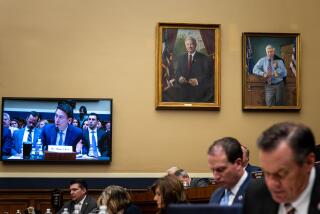Why Bashing Caught a Wave in America : Japan: The deterioration in American public attitudes has little to do with racism and much to do with the trade imbalance.
- Share via
Bashing those with whom we disagree is nothing new in the United States. The practice often amounts to little but letting off steam by a few malcontents. In earlier years our Japan-bashing was of largely this nature. Lacking grass-roots support, demagogic criticism of Japan then largely fell on deaf ears.
All that has changed. Japan-bashers in America today find themselves in a peculiar position. They are not out there rousing public opinion so much as they are reflecting it--a huge difference.
I sense this negative view of Japan at U.S. grass-roots levels has risen to a point where it now stands as the No. 1 relationship problem facing policy-makers and diplomats of our two nations.
For decades the attention of our respective officials centered on devising solutions to a series of economic disputes. Today that attention is being forced to shift. Now these officials must constantly look over their shoulders as they seek ways to contain adverse U.S. public sentiment. In short, negative grass-roots attitudes have become a new driving force injected into every phase of our bilateral dealings.
The intriguing question is, of course, why do these attitudes exist? Where did they come from?
A few Japanese sources offer the specter of racism. We all realize that at least some racist tendencies exist in every society. But these deteriorating American attitudes toward Japan are a fairly recent development. Ten years ago, no such negativism existed; at least not in any significant amount. Has the United States suddenly become a racist society? Hardly. No, basic answers must be sought elsewhere.
I would like to suggest three reasons for the deterioration in U.S. public attitudes toward Japan:
--Neither Japan nor the United States has dealt effectively with underlying causes, especially the long-persisting trade imbalance. Remember the 1984 report to President Reagan and the Japanese prime minister issued by a group of leaders from both countries--the so-called “wise men”? The main recommendation of that report called for both governments to do a better job of managing what was even then described as an “uneasy relationship”--uneasy because of an “intolerable” trade imbalance that amounted then to a mere $20 billion-plus. Despite this pointed warning, the annual imbalance was permitted to soar to nearly $60 billion in the next four years. Adverse American public reaction toward Japan soared right along with it.
--Both nations have engaged in dubious practices that now leave each of us with a low opinion of the other’s credibility. From the early ‘70s on, American trade negotiations repeatedly threatened Japan with harsh action by a rogue Congress. “Give us what we seek or our Congress will lower the boom on you” was an American bargaining tactic of record. Yet years went by and Congress did not act. Even the eventual ’88 trade act was little more than a wrist slap. So today Japanese negotiators have reason to ignore American threats. “Wolf” has been cried too often.
Meanwhile, since the mid-’70s, Americans have watched as each new Japanese government, in turn, promised solemnly to bring down the imbalance. Instead the imbalance kept going up. When neither one side’s threats nor the other side’s promises can be believed, diplomatic credibility crashes; disputes become ever more difficult to resolve.
--Because of disparate cultures, our nations come at the issues between us from wildly different perspectives. For instance, the Japanese often seem to view the trade imbalance issue almost solely in terms of fault. Faulty American business practices and government economic policies (low savings rates, rising fiscal deficit, poor productivity, shabby product quality, short-term outlook, inadequate marketing effort in Japan, etc.) are endlessly recited as American deficiencies. With a wholly different mind-set, Americans see the trade imbalance in quasi-moral terms--terms of fairness. We trumpet slogans like “level playing field,” “two-way street” and “free ride” to reflect our displeasure. Thus when accusations of “it’s all your fault” clash with “you’re unfair” at the conference table, the parties communicate on different wave lengths. Not only disenchantment but frustration mounts on both sides.
The next question becomes: What fallout can be expected from these critical grass-roots sentiments? Here some caution must be suggested. Despite the trend described here, Japan still has a lot going for it in the United States. First of all, no people admire success more than Americans. Japan is an acknowledged success. Few people are more impressed by money than Americans. Today Americans are fully aware that Japan leads the world in capital resources. Americans have grown fond of Japanese products. They could possibly do without them but it would be painful. And though Japan’s economic practices may be dimly viewed, Japan itself continues to have the respect of American citizens. A recent Roper Poll found that 61% of Americans still consider Japan to be a close friend and ally second only to Britain. Furthermore, at Washington public-policy levels we see officials who understand the perils of fomenting a trade war and who are well aware that Japan has proven to be a dependable ally. These and other factors will continue to provide some measure of restraint on negative opinion as it bubbles up from the American grass roots.
But unless and until this trade imbalance is markedly and progressively reduced, the climate of public opinion in the United States will likely fester and perhaps even worsen. Concerted effort to remove this symbol is more than ever a worthy goal for our two countries. Any view that letting matters drift in the hope that routine diplomatic activity and minor adjustments in macroeconomic policies will be adequate to deal with the problem is illusory. American grass-roots disenchantment will not let the matter rest.
More to Read
Sign up for Essential California
The most important California stories and recommendations in your inbox every morning.
You may occasionally receive promotional content from the Los Angeles Times.













